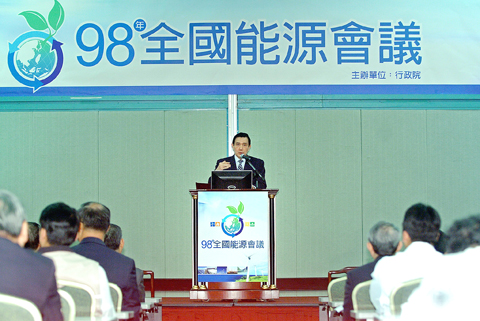President Ma Ying-jeou (馬英九) yesterday said legislators should condense eight versions of a bill on renewable energy as soon as possible and pass the negotiated version by the end of this session.
“We should do our duty as a member of the international community,” Ma said yesterday on the opening day of the National Energy Conference yesterday at the Taipei International Convention Center.
“I’m continuing my efforts when I was mayor of Taipei to make Taiwan more eco-friendly. The issue of sustainability is at the forefront of the agendas of all major governments right now. And it is on ours as well,” he said.

PHOTO: FANG PIN-CHAO, TAIPEI TIMES
A day earlier the Presidential Office had declined to take a stance on the renewable energy bill, saying it was a matter for the Executive Yuan to consider.
Ma said he had aggressive goals for reducing carbon dioxide emissions.
Taiwan ranked 22nd in the world in 2006 in terms of total carbon dioxide emissions, producing almost 1 percent of the world aggregate, the Energy Bureau has said.
“To have a clean environment for future generations, we seek to return to 2008’s carbon dioxide levels by 2020, 2000’s carbon dioxide levels by 2025 and half of 2025’s carbon dioxide levels by 2050,” Ma said.
Ma also promised to establish 60,000 hectares of national parks in Chiayi, Pingtung and Hualien counties, and another 1,000 hectares of national forest.
In response, Chinese Nationalist Party (KMT) caucus secretary-general Yang Chiung-ying (楊瓊瓔) said the caucus was ready to support the bill.
The different versions of the bill were referred to cross-party talks on Jan. 8, Yang said, calling on legislators across party lines to help the final version clear the floor by the end of the spring session.
KMT caucus deputy secretary-general Lin Hung-chih (林鴻池) blamed the Democratic Progressive Party (DPP) caucus for stalling the bill.
Lin said the versions had been stalled for seven years in the legislature because the DPP had not pushed the bills during the first six of those years when it was in power.
The DPP did not, however, control the legislature while in power.
Lin said reaching a consensus on one version of the renewable energy bill was difficult.
DPP Legislator Chen Ting-fei (陳亭妃) said the KMT caucus, which has a majority in the legislature, had consistently boycotted the bill, preventing it from proceeding to a vote.
Chen said the KMT caucus had refused to send the bill to cross-party negotiations until now and that it had clearly stalled the bill on purpose.
Chen said the KMT government shouldn’t try to fool the public.
Meanwhile, representatives of the nation’s six major industrial groups visited Premier Liu Chao-shiuan (劉兆玄) yesterday to convey their opinions on a bill to reduce carbon dioxide emissions.
Cabinet Spokesman Su Jun-pin (蘇俊賓) told reporters after the meeting that the groups had agreed that the legislation was needed, but had suggested that the Executive Yuan provide more details on its proposal.
But Su said the Executive Yuan would need to approve the proposed bill at today’s meeting of the Cabinet if it is to be sent to the legislature in time for it to be negotiated and passed during this session.
ADDITIONAL REPORTING BY RICH CHANG

RUN IT BACK: A succesful first project working with hyperscalers to design chips encouraged MediaTek to start a second project, aiming to hit stride in 2028 MediaTek Inc (聯發科), the world’s biggest smartphone chip supplier, yesterday said it is engaging a second hyperscaler to help design artificial intelligence (AI) accelerators used in data centers following a similar project expected to generate revenue streams soon. The first AI accelerator project is to bring in US$1 billion revenue next year and several billion US dollars more in 2027, MediaTek chief executive officer Rick Tsai (蔡力行) told a virtual investor conference yesterday. The second AI accelerator project is expected to contribute to revenue beginning in 2028, Tsai said. MediaTek yesterday raised its revenue forecast for the global AI accelerator used

TEMPORARY TRUCE: China has made concessions to ease rare earth trade controls, among others, while Washington holds fire on a 100% tariff on all Chinese goods China is effectively suspending implementation of additional export controls on rare earth metals and terminating investigations targeting US companies in the semiconductor supply chain, the White House announced. The White House on Saturday issued a fact sheet outlining some details of the trade pact agreed to earlier in the week by US President Donald Trump and Chinese President Xi Jinping (習近平) that aimed to ease tensions between the world’s two largest economies. Under the deal, China is to issue general licenses valid for exports of rare earths, gallium, germanium, antimony and graphite “for the benefit of US end users and their suppliers

Dutch chipmaker Nexperia BV’s China unit yesterday said that it had established sufficient inventories of finished goods and works-in-progress, and that its supply chain remained secure and stable after its parent halted wafer supplies. The Dutch company suspended supplies of wafers to its Chinese assembly plant a week ago, calling it “a direct consequence of the local management’s recent failure to comply with the agreed contractual payment terms,” Reuters reported on Friday last week. Its China unit called Nexperia’s suspension “unilateral” and “extremely irresponsible,” adding that the Dutch parent’s claim about contractual payment was “misleading and highly deceptive,” according to a statement

Artificial intelligence (AI) giant Nvidia Corp’s most advanced chips would be reserved for US companies and kept out of China and other countries, US President Donald Trump said. During an interview that aired on Sunday on CBS’ 60 Minutes program and in comments to reporters aboard Air Force One, Trump said only US customers should have access to the top-end Blackwell chips offered by Nvidia, the world’s most valuable company by market capitalization. “The most advanced, we will not let anybody have them other than the United States,” he told CBS, echoing remarks made earlier to reporters as he returned to Washington